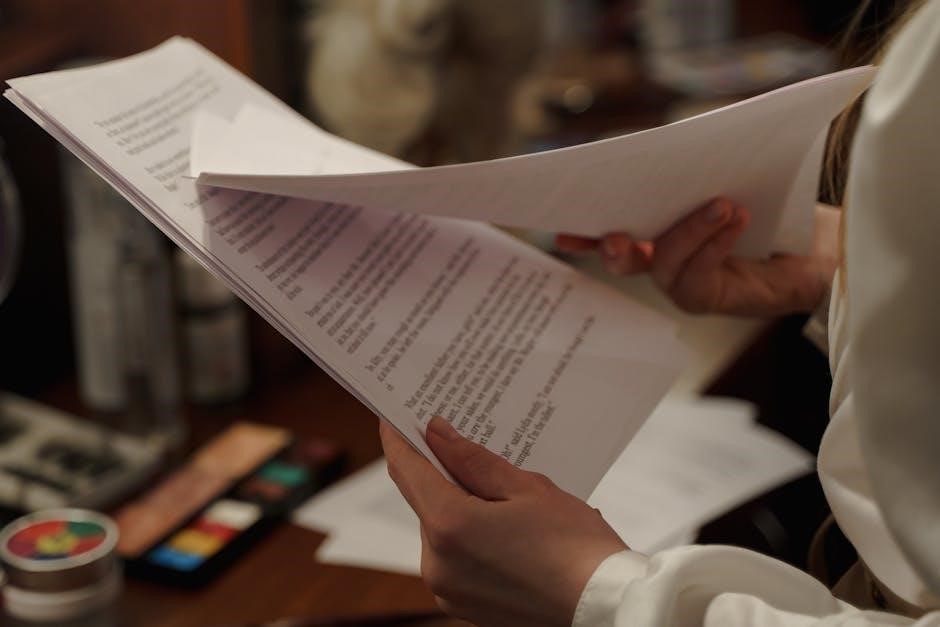Vocabulary Definitions
Understanding key vocabulary in Act III enhances comprehension. Terms like devise (to imagine), pilcher (sword cover), peppered (finished), and amerce (to punish) are crucial for interpreting scenes and character motivations effectively.

Key Terms from Act III
Key terms in Act III include devise (to imagine), pilcher (a sword cover), peppered (finished), and amerce (to punish). These words reflect the conflicts and emotional depth. For example, devise highlights Romeo’s imaginative sorrow, while amerce explains his banishment. Understanding these terms enriches the play’s dramatic tension and character motivations, providing insight into the tragic events unfolding in Verona.
Understanding Contextual Usage
Contextual usage in Act III reveals how vocabulary shapes the play’s tension. For instance, devise reflects Romeo’s sorrowful imagination, while amerce underscores his banishment. Peppered describes Mercutio’s fatal wounds, emphasizing tragedy. These terms, rooted in their contexts, illustrate the characters’ emotional struggles and the escalating conflict. Understanding their meanings deepens the appreciation of Shakespeare’s language and the tragic unfolding of events in Verona.

Plot Summary of Act III
Act III unfolds with tragic intensity as Mercutio’s death leads to Romeo’s banishment, escalating the feud and isolating the lovers, while Juliet faces a forced marriage.
Overview of Main Events
Act III begins with a fatal duel in Verona’s streets. Mercutio’s death leads to Romeo’s banishment, intensifying the families’ feud. Juliet faces emotional turmoil upon learning of Tybalt’s death and Romeo’s exile. Lord Capulet, eager to restore family honor, arranges her marriage to Paris. The act culminates in a heart-wrenching farewell between Romeo and Juliet, setting the stage for the play’s tragic conclusion.
Key Turning Points in the Act
Act III’s pivotal moments include the fatal duel where Mercutio dies, prompting Romeo to kill Tybalt, leading to his banishment. Juliet’s emotional turmoil intensifies as she learns of Tybalt’s death and Romeo’s exile. Lord Capulet’s rash decision to marry her to Paris escalates the conflict. The act concludes with the lovers’ heart-wrenching farewell, setting the stage for the tragic events that will unfold, as fate and circumstance tighten their grip on the star-crossed lovers.

Analysis of Main Scenes
Act III’s scenes are filled with tension and emotional depth, driving the tragic narrative forward. Each scene escalates the conflict, revealing character motivations and foreshadowing inevitable tragedy.
Scene 1: The Fatal Duel
Act III, Scene 1, unfolds in Verona’s streets, where tensions between Montagues and Capulets erupt. Tybalt, seeking revenge, challenges Romeo, who refuses to fight. Mercutio steps in, clashing with Tybalt, leading to Mercutio’s tragic death. Overcome with grief, Romeo avenges his friend by killing Tybalt. The Prince banishes Romeo, intensifying the tragedy. This scene marks a turning point, escalating the feud and sealing the lovers’ fate with irreversible consequences.
Scene 2: Juliet’s Emotional Turmoil
Juliet, unaware of the duel, eagerly awaits Romeo, her heart filled with hope. The Nurse arrives with devastating news of Tybalt’s death and Romeo’s banishment. Juliet’s emotions shift from joy to despair, torn between love for Romeo and loyalty to her family. She grapples with grief, confusion, and desperation, her world shattered by the tragedy; This scene vividly portrays Juliet’s vulnerability and the overwhelming pressures she faces, deepening the tragic tension of the play.
Scene 3: Romeo’s Banishment
Romeo, overwhelmed by Mercutio’s death and his role in Tybalt’s killing, faces the consequences of his actions. The Prince banishes him from Verona, a punishment Romeo views as worse than death. Desperate and grief-stricken, Romeo seeks refuge in Friar Lawrence’s cell, where the Friar urges him to see banishment as an opportunity for a future with Juliet. This scene highlights Romeo’s emotional turmoil and the escalating tragedy of his situation, deepening the play’s dramatic tension.
Scene 4: Capulet’s Rash Decision
Lord Capulet, driven by a desire to restore family honor and distract from recent tragedy, hastily arranges Juliet’s marriage to Paris. Ignoring Juliet’s emotional state, he believes this union will mend the family’s reputation and appease the Prince. His impulsive decision reflects societal norms where parental authority prevails, deepening Juliet’s conflict between loyalty to her family and her love for Romeo, and escalating the tragic tension of the play.
Scene 5: The Lovers’ Farewell
In a heart-wrenching farewell, Juliet and Romeo confront the harsh reality of their situation; Juliet, desperate and grief-stricken, pleads for Romeo to stay, while he prepares to leave Verona. Their passionate exchanges highlight their deep love, but the weight of Rome’s banishment looms heavily. Friar Lawrence offers hope with his plan, but the scene underscores the societal forces tearing them apart. The lovers’ farewell marks the beginning of their descent into sorrow and isolation, emphasizing the tragedy of their circumstances and the unyielding conflict between love and duty.

Character Analysis
Romeo’s transformation in Act III reveals his emotional depth, shifting from a lovesick romantic to a grief-stricken avenger, driven by anger and despair after Mercutio’s death.
Romeo’s Transformation in Act III
Romeo undergoes a profound transformation in Act III, shifting from a peaceful lover to a vengeful avenger. Initially, he avoids conflict, refusing to fight Tybalt due to his secret marriage to Juliet. However, upon learning of Mercutio’s death, Romeo’s grief and anger overwhelm him, leading him to kill Tybalt in a fit of rage. This impulsive act results in his banishment, marking a turning point in his character. Romeo’s emotional turmoil intensifies as he grapples with the consequences of his actions, revealing a darker, more desperate side to his personality.

Juliet’s Struggle with Loyalty and Love
Juliet faces an intense emotional conflict in Act III, torn between her loyalty to her family and her love for Romeo. Upon learning of Tybalt’s death and Romeo’s banishment, she feels betrayed and heartbroken. Her loyalty to her family is tested when she is forced to consider marrying Paris, a union arranged by her father. Juliet’s internal struggle deepens as she must choose between obeying her parents and remaining true to her love for Romeo, highlighting her vulnerability and the societal pressures she endures.
Tybalt’s Role in Escalating the Conflict
Tybalt’s relentless anger toward Romeo drives the tragic events of Act III. His determination to avenge Romeo’s presence at the Capulet ball leads to a deadly duel with Mercutio. When Mercutio is fatally wounded, Tybalt’s actions provoke Romeo to kill him in revenge. Tybalt’s impulsive and vengeful nature escalates the feud, resulting in Mercutio’s death, Romeo’s banishment, and the intensification of the families’ hatred, setting the stage for further tragedy.

Themes and Motifs
Central themes in Act III include fate, loyalty, and impulsive decisions, highlighting the destructive nature of unchecked emotions and the inevitability of tragedy.
Love vs. Hate: A Central Theme
In Act III, Shakespeare vividly contrasts love and hate, with Romeo’s devotion to Juliet clashing against the escalating violence. Love, represented by Romeo’s refusal to fight Tybalt, is tested by hatred’s intensity. The tragic duel and its aftermath highlight how hatred’s destructive power overshadows love’s redemptive potential, leading to devastating consequences for the lovers and their families, deepening the play’s emotional and thematic complexity.
Fate and Tragedy in Act III
Fate plays a pivotal role in Act III, steering characters toward inevitable tragedy. The duel’s tragic outcome and Romeo’s banishment highlight the inescapability of fate. Emotional turmoil and impulsive decisions accelerate the downward spiral, leading to devastating consequences. The intertwining of fate and human error underscores the play’s tragic nature, emphasizing the inexorable path toward heartbreak and loss for the star-crossed lovers.
Loyalty and Betrayal
Loyalty and betrayal are central themes in Act III, as characters face conflicting obligations. Mercutio’s loyalty to Romeo leads him to fight Tybalt, resulting in tragic consequences. Romeo, torn between loyalty to Mercutio and his love for Juliet, betrays his own moral code by killing Tybalt. Juliet, meanwhile, grapples with loyalty to her family and her love for Romeo, creating a deeply personal conflict. These acts of loyalty and betrayal drive the tragic trajectory of the play.

Key Quotes and Their Significance
“A plague o’ both your houses!” ⸺ Mercutio’s curse reflects his anger and foresight of the tragic consequences of the feud. “O, I am fortune’s fool!” ⎼ Romeo’s regret after killing Tybalt, highlighting his sense of helpless fate.
Analysis of Iconic Lines
Mercutio’s “A plague o’ both your houses!” serves as a curse that highlights the destructive nature of the feud and foreshadows tragedy. Romeo’s “O, I am fortune’s fool!” reveals his regret and recognition of fate’s control. These lines underscore themes of fate, revenge, and the devastating consequences of impulsive actions, deepening the emotional impact of the play and illuminating the characters’ struggles with destiny and personal responsibility.
Quotes Reflecting Character Motivations
Romeo’s “O, I am fortune’s fool!” reveals his guilt and recognition of fate’s control. Juliet’s “What storm is this that you have brought to me?” highlights her desperation upon learning of Romeo’s banishment. Tybalt’s “Mercutio, thou consortest with Romeo?” exposes his hatred and desire for revenge. These quotes reflect the characters’ emotional struggles, love, and vengeance, driving the tragic events of Act III and showcasing their complex motivations amidst the escalating conflict.

Study Questions and Answers
What motivates Romeo to kill Tybalt? How does Juliet react to Romeo’s banishment? These questions explore character motivations, fate, and tragic consequences in Act III.
Comprehension Questions
What events lead to Mercutio’s death, and how does this impact Romeo?
How does Juliet react upon learning of Tybalt’s death and Romeo’s banishment?
Why does Capulet decide to marry Juliet to Paris, and how does this affect her?
What role does Benvolio play in explaining the fight to the Prince?
How does Romeo’s banishment influence the lovers’ relationship?
What does Friar Laurence suggest to help Romeo and Juliet?
Why is Juliet’s farewell to Romeo so emotional?
How does the feud between families escalate in Act III?
Critical Thinking Questions
How does Romeo’s impulsive behavior in the duel with Tybalt contribute to the tragic outcome?
What role does fate play in the events of Act III, and how do characters respond to it?
How does Juliet’s loyalty to her family conflict with her love for Romeo?
What message does Shakespeare convey through the death of Mercutio, and how does it impact the play’s themes?
How does Friar Laurence’s advice influence Romeo and Juliet’s decisions?
What does the act reveal about the consequences of unchecked hatred and revenge?
Discussion Topics
- How does the theme of fate vs. free will influence the characters’ decisions in Act III?
- Analyze the impact of impulsive actions on the play’s tragic outcome.
- Discuss how loyalty to family and love conflict in Romeo and Juliet’s choices.
- What role does societal expectation play in shaping the characters’ behaviors?
- How does Shakespeare use Mercutio’s death to explore themes of friendship and revenge?
- Examine the emotional transformation of Juliet from hope to despair in Act III.
